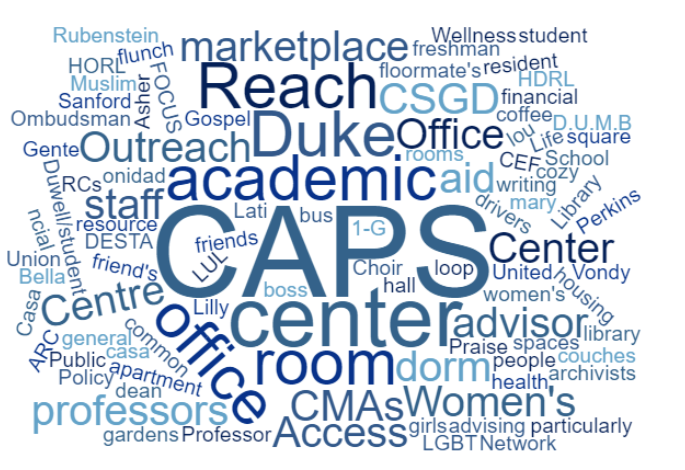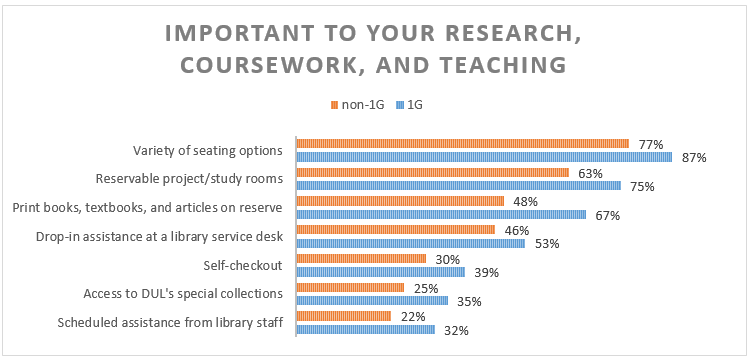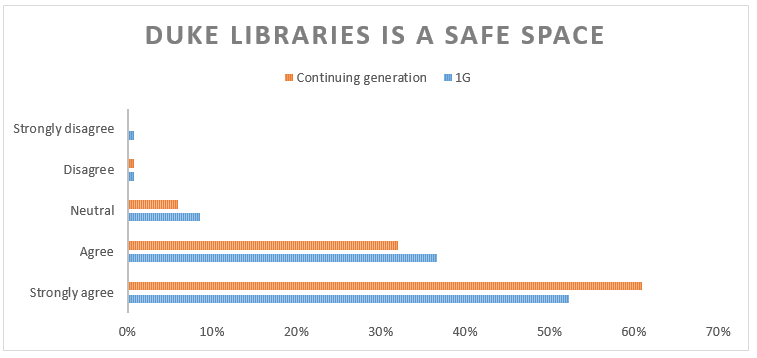How can the Duke Libraries support the needs of first-generation (1G) college students at Duke?
A team of library staff became interested in this question after noticing that 1G students’ responses to a survey question about the Libraries were different from those of continuing-generation students. While many 1G students are successful in and out of Duke classrooms, we wondered how their experiences might differ from those of continuing-generation students.
To begin our project, we read existing research on academic libraries’ support of 1G students and spoke with offices on campus that support 1G students, such as the Duke Office of Access & Outreach. Then, we conducted six focus groups with 1G students, in addition to analyzing responses from the Libraries’ 2018 user survey (which included 2,381 student responses) for 1G and continuing generation students. Our full report discusses this process and our findings in more detail, including concrete recommendations for improving library services.
While the experiences of 1G students are not monolithic, we identified nine core findings, which speak to challenges students experience and suggest specific points for intervention and support. One important overall finding is that 1G challenges are student challenges: support or expansions of campus and library services targeted toward 1G students will help all students succeed.
Finding 1. 1G students perceive a dearth of academic and social information capital.
We asked all focus group participants the following, “Have you ever felt like other people around you know things about college that you don’t know about?” Each time, the response from the group was an overwhelming expression of, “Yes, of course, all the time.” One student captured the experience of her continuing-generation:
“Who told you that? Have you been told your whole life you have to do this? Was there an info session I missed?”
Students repeatedly referred to Duke’s demanding academic environment and the abrupt transition from their high school habits to the expectations of Duke classrooms. At times Duke staff may also take for granted how much knowledge incoming students have.
Information capital is not limited to classrooms; it is also used in social contexts and in navigating college life. 1G experiences are diverse: while some students reported feelings of isolation, others described feeling supported through orientation programs and a lively community on Duke’s East Campus, where many undergraduates live.
While 1G students perceive that continuing generation students are able to rely on family to guide them through the myriad of informational and financial challenges encountered in college, 1G students do not have access to this information from their parents. In addition, they sometimes feel unable to share the stress of college with their parents.
“You have the pressure of pretending ‘I’m okay.’ My parents are so proud of me that I can’t tell them what’s really going on.”
Finding 2. Finances are stressful, and an early source of feeling unwelcome.
Our past research suggested that feeling that one doesn’t belong is a global concern for first-years adjusting to life on a college campus, and one particularly poignant for 1G students. Duke is no exception. Several focus group participants shared comments they received from their peers after revealing that they were the first in their families to attend college:
“Oh you’re smart for a first-generation student. I never would have known!”
First-year focus group participants quoted other early encounters with roommates or colleagues that continued to sting. Many of these comments reflect the fact that financial security is one of the starkest differentiators between many 1G students and their peers at Duke.
“There’s definitely a mentality that exists at Duke that middle class is poor and lower class is even worse. Not that everybody is like that, but it certainly exists.”
When 1G students reveal aspects of their own financial circumstances to their peers, they receive blowback in several ways. For example, a few students shared that their financial aid was stigmatized, with other students suggesting that those who receive aid are very “lucky” to pay so little, or stating explicitly their own significant costs of attendance, possibly to engender shame or guilt. These experiences are formative, alienating, and angering.
Finding 3. An ecosystem of supportive offices and people on campus is critical, but knowledge of and willingness to access resources takes time.
The landscape described above is important to understand because it is the one 1G students step into when they arrive at Duke. However, peer attitudes and financial impediments are difficult intervention points. In contrast, faculty, older peers, and staff are better positioned to be support systems native to the institution:
“When you go to Duke resources, people are more than happy to help you. Adults at Duke are much more receptive and much more understanding of our issues as first-generation students.”
In general, students spoke warmly of the many services, programs, and offices offered on campus. This included the Office of A&O, resident assistants (RAs), peer advisors, a close community on East Campus as freshmen, pre-orientation, the Women’s Center, the Financial Aid office, Counseling & Psychological Services (CAPS), Duke Reach, and cultural student groups.

The staff in the Office of A&O were mentioned frequently. Students praised staff members, citing their open door policy, knowledge, and willingness to offer genuine and consistent support.
Unfortunately, some students reported feeling stigmatized by others when they were known to have used campus resources such as CAPS, the Academic Resource Center (ARC), the Women’s Center, and identity centers.
Finding 4. The cost of textbooks is a special pain point.
In most focus groups, students shared the challenge, stress, and fear of purchasing expensive textbooks. This anxiety about textbooks rests on top of an ongoing concern about finances. Students described extensive efforts to find affordable copies, taking great pains to maintain their workbooks so they could re-sell them at the end of the semester, and to locate upper-level textbooks that were not available through Textbook on Reserve.
“[Laughter] I’ve never researched so hard as when I’m looking for a digital version of a textbook!”
Students who knew about and utilized the Libraries Textbooks on Reserve made special note of its impact and importance in alleviating some financial burden.
“The textbook rental program has been really important and impactful for me… To get them here and be able to rent them out for 3 hours has been perfect. It’s really important to have that.”
Results from the Libraries biennial student survey also support the idea that the Textbooks on Reserve program is particularly important for 1G students.
Finding 5. 1G challenges are challenges common to many Duke students.
Broadly speaking, 1G students’ responses to our 2018 survey did not differ from those of continuing-generation students. Both groups are generally confident in their ability to use library resources and report that they have successfully used the library and/or the library website to find research articles and books for class assignments. They find the website easy to use, believe that the library is welcoming, that library staff are helpful, and that the library is an important part of their experience at Duke.
1G students were more likely to report that expansion of the Textbooks on Reserve program and the device-lending program (for borrowing equipment such as laptops or cameras) would improve their library experience a great deal.
Overall, the four areas in which more than 50% of all undergraduates responded that expanded services would improve their library experience “a lot” include:
- More spaces for quiet/individual study
- More textbooks to check out for my classes
- Additional specialized spaces for honors researchers, graduate students, or other student populations
- More spaces for collaborative study
Survey data indicated a few differences between the services that 1G and continuing generation students believe to be important to their academics. The chart below shows services that 1G students more frequently listed as “important” than continuing generation students.

Finding 6. It is sometimes hard to find existing resources at the Libraries.
When asked about services they wish they had known about earlier, our 1G focus group participants mentioned the Textbooks on Reserve program, library workshops (e.g., Matlab workshops), subject librarians, lockers available for short-term use, and the ability to reserve study rooms. Students described numerous library resources they have discovered seemingly by chance or long after their first semester at Duke. At multiple points during the focus groups students expressed that important services are not adequately marketed or shared with all 1G students. First-year 1G students reiterated the feeling of “unknown unknowns”: of understanding that many resources are available, but often finding it difficult to locate specific points of access.
Finding 7. Getting help from experts at the Libraries is important, but difficult.
1G students indicated that reaching out to library staff can be intimidating or even frightening. They described an initial barrier to asking for help, even while knowing it is likely the best way to receive assistance. Students noted feeling that their questions are “silly,” and they believe they have “gaps” in their knowledge. Students also reflected that it would be helpful for the person providing guidance to understand students’ lack of familiarity with library resources and services.
“We have a librarian for an English department, and for the Linguistics department… but it would be awesome to have a 1G librarian. Just someone who already knows that we don’t know anything, and it’s okay.”
Finding 8. Checking out books using call numbers is daunting.
Focus group participants frequently noted difficulty finding and checking out books using call numbers. 1G students did not pin this difficulty on library staff, but rather on their own lack of knowledge.
“The assumption is that we’ve been in libraries before. They [library staff] were helpful after I admitted I didn’t know my way around.”
The stacks are an understandably daunting environment, especially for those unfamiliar with academic libraries. Students reported feeling supported once they made their confusion clear. Previous assessments have shown that the difficulty of understanding call numbers and finding materials in the Libraries is one experienced by many students, regardless of 1G status.
Finding 9. While students generally view the Libraries as a safe space, 1G students feel less strongly that this is true.
Some of the most striking differences in responses between 1G and continuing-generation students relate to the survey question asking the extent to which both Duke Campus and the Libraries feel like a safe space. For the purposes of the user survey, a “safe space” was defined as a place in which people can feel safe from discrimination, harassment, and any other emotional or physical harm.
Only 20% of 1G students “strongly agree” that Duke Campus is a safe space for them, compared to 36% of continuing-generation students. While it is a small percent, four times as many 1G students (4% compared to 1%) “strongly disagree” that campus is a safe space for them. Duke University has some work to do before all students, and especially 1G students, feel that it is a safe space.
Both 1G and continuing generation students feel strongly that the Libraries are more of a safe space than Duke University. This is encouraging, as a major goal of the Libraries is to provide a welcoming space for all. Differences in feelings about the Libraries as a safe space between 1G and non-1G are less stark but still present: 52% of 1G students “strongly agree” that the Libraries are a safe space compared to 61% of continuing-generation students.
Summary
First-generation students are resilient and successful members of the Duke community. The early years on campus, which involve finding the right communities for support and learning new academic skills, can be a difficult transition for some. While all students experience challenges in college, 1G students may not have access to certain sources of information capital and can have significant financial stressors that are difficult for many peers to understand. The Duke University Libraries are well poised to support the success of 1G students on campus. Library staff can help reduce the burdens associated with transitioning from high school to college by making academic and research support known to students early and often, providing access to cost-prohibitive textbooks, and continuing to make the Duke Libraries a welcoming space for all students.
What’s next?
These findings became the basis of the 19 recommendations outlined in the research team’s full report. For example, one important recommendation was to expand the Textbooks on Reserve program. Though the library already had a pilot program, it became clear that all students would benefit from expanding the program to include more textbooks and increasing marketing of the program. This fall the program expanded to include textbooks from the 100 largest courses on campus, and the Libraries has already seen an increase in student use of these books. There was also a recommendation that a librarian be designated as a 1G Student Success Librarian as a way to build the ecosystem of supportive offices and people described in focus groups. Arianne Hartsell-Gundy is currently serving in this role as a way to coordinate the libraries’ efforts, make connections with other programs and departments providing support, and serve as a point of contact for 1G students.
Additionally, The Libraries formed a 1G Study Recommendations Implementation Team (headed by the 1G Student Success Librarian) to prioritize recommendations and work across the Libraries to improve services, library instruction, and marketing/outreach to 1G students. One of the team’s first projects was to increase the library presence during the Rubenstein Scholars summer program. In addition to providing a library instruction session and one-on-one appointments with the students in this program, librarians attended a poster session and a mixer as a way to increase their presence. Also, the team is engaging with the staff dedicated to working on our service desks to find ways to help students feel more comfortable asking questions and navigating our book stacks. The team is pleased with their progress thus far and looks forward to finding new ways to connect with and support 1G students.
By: Joyce Chapman, Brenda Yang, Arianne Hartsell-Gundy, Emily Daly




One thought on “Understanding the experiences and needs of 1G students at Duke”
Comments are closed.